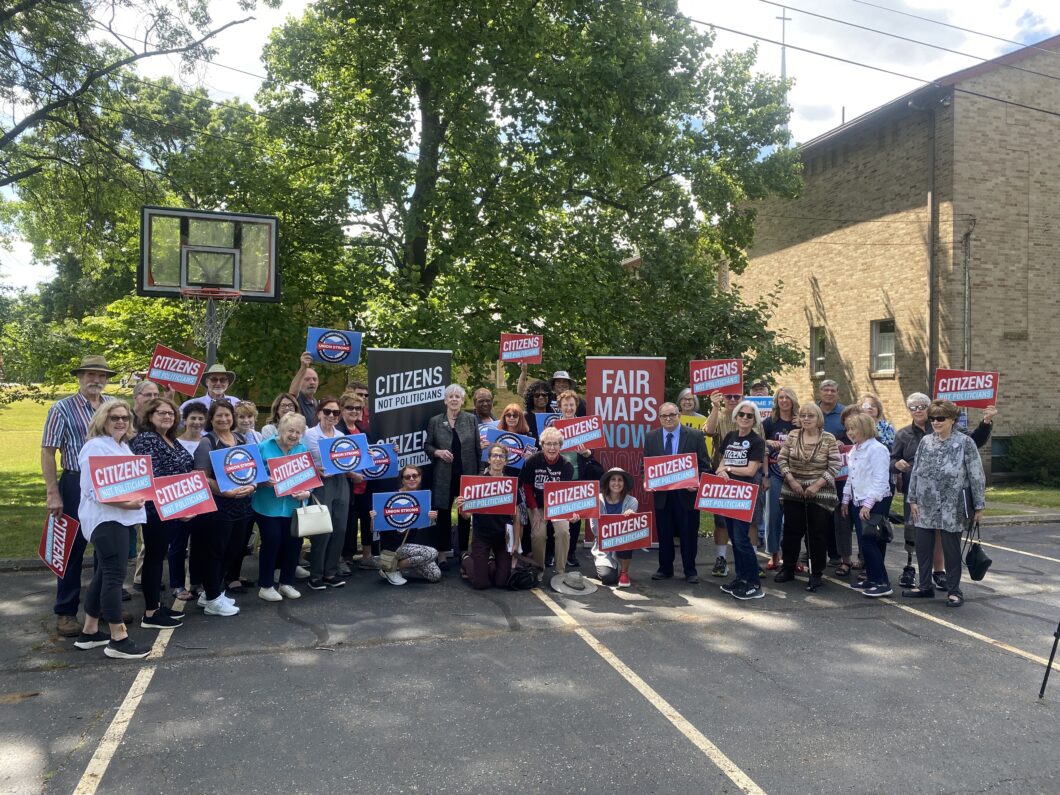Retired Ohio Supreme Court Chief Justice Maureen O’Connor on Tuesday visited polling places across the 6th Ohio Congressional District for the special election. She met with voters and local leaders and thanked volunteers gathering signatures for a constitutional amendment to end gerrymandering.
“At the same time that you are doing your civic duty and participating in this election, the politicians in Columbus continue to shirk their duty as they force this gerrymandered congressional district that divides communities and undermines your voice in our representative government,” O’Connor said at Eugenia Atkinson Recreation Center in Youngstown. “This is a historic election because today and in November will be the last time you are forced to vote in a district designed by politicians for politicians. We are going to restore representative government in Ohio by putting citizens – not politicians – in charge of drawing legislative maps.”
O’Connor spent the day traveling the 200-mile length of the district, starting the day in rural Washington County south of Marietta, visiting polling places in Marietta, Steubenville, Canton, and ending in Youngstown. Along the way she met with voters, volunteer signature gatherers, and leaders of the nonpartisan Citizens Not Politicians coalition, including leaders of the Ohio AFL-CIO, the ACLU of Ohio, the League of Women Voters of Ohio, and Common Cause Ohio.
The June 11 special congressional election for Ohio’s 6th district, covering much of the eastern part of the state, is being held to fill the seat vacated by Rep. Bill Johnson, who resigned to become the president of Youngstown State University. The candidates are Republican Michael Rulli, a state senator, and Democrat Michael Kripchak, a businessman and U.S. Air Force veteran. The winner will stand for reelection on Nov. 5.
An analysis by University of Cincinnati Political Science Professor David Niven found that the 6th U.S. House District of Ohio stretches three hours from Coolville to Youngstown, encompasses four different regional economies, and slices apart predominantly African American areas of Massillon. It even divides a two-building school system into multiple congressional districts.
“This district fails to foster robust representation and instead, is culturally and economically incoherent, reinforcing the need for redistricting reform,” Niven said.
“The citizens of Youngstown should not share a Congressional district with people many miles away who have a different set of interests and priorities,” said the Rev. Michael Harrison, Union Baptist Church & Ohio Baptist State Convention and chair of the Ohio Organizing Collaborative. “The time for change is now. We can no longer allow politicians to manipulate our districts for their own gain. It’s time to put the power back in the hands of the people, where it belongs.”
The proposed Citizens Not Politicians Amendment would replace the current process run entirely by politicians with a new process run by Ohio citizens.
Gerrymandering is the practice by which politicians draw political boundaries to give themselves an unfair advantage, undermining fair representation and leading to political stagnation and ineffective policy. Ohio is recognized as one of the most gerrymandered states in the nation.
Nationally, Ohio is recognized as one of the worst states for gerrymandering, undermining proportional representation and leading to political stagnation and ineffective policy.
More than 9 million Ohioans, or 77% of the state population, live in districts where one party has a severe advantage in the 2024 Ohio House of Representatives elections, according to an analysis by the Brennan Center for Justice at the NYU School of Law.
In addition, Ohio’s partisan map-drawing process meant that nearly half of the 99-member Ohio House lacked a competitive primary contest to nominate the likely winners for the upcoming general election, the Brennan analysis found.
The nonpartisan group Citizens Not Politicians has volunteers across Ohio collecting signatures. They must collect more than 413,000 valid signatures by July 3 to qualify for the November ballot.
The Citizens Not PoliticiansAmendment will:
- Create the 15-member Ohio Citizens Redistricting Commission made up of Republican, Democratic and independent citizens who broadly represent the different geographic areas and demographics of the state.
- Ban current or former politicians, political party officials, and lobbyists from sitting on the commission.
- Require fair and impartial districts by making it unconstitutional to draw voting districts that discriminate against or favor any political party or individual politician.
- Require the commission to operate under an open and independent process.
Seven other states have similar independent citizen redistricting commissions: Arizona, California, Colorado, Idaho, Michigan, Montana, and Washington.
If approved, the new commission could draw maps that could be in place as early as the 2026 elections.
For more information visit https://www.citizensnotpoliticians.org.
About Citizens Not Politicians
Citizens Not Politicians is an Ohio coalition working toward a transparent and independent redistricting procedure, striving to empower the people of Ohio to generate equitable legislative maps. The initiative is supported by a wide-ranging, bipartisan group, marking a significant move toward democratic integrity and fair representation in the state.

